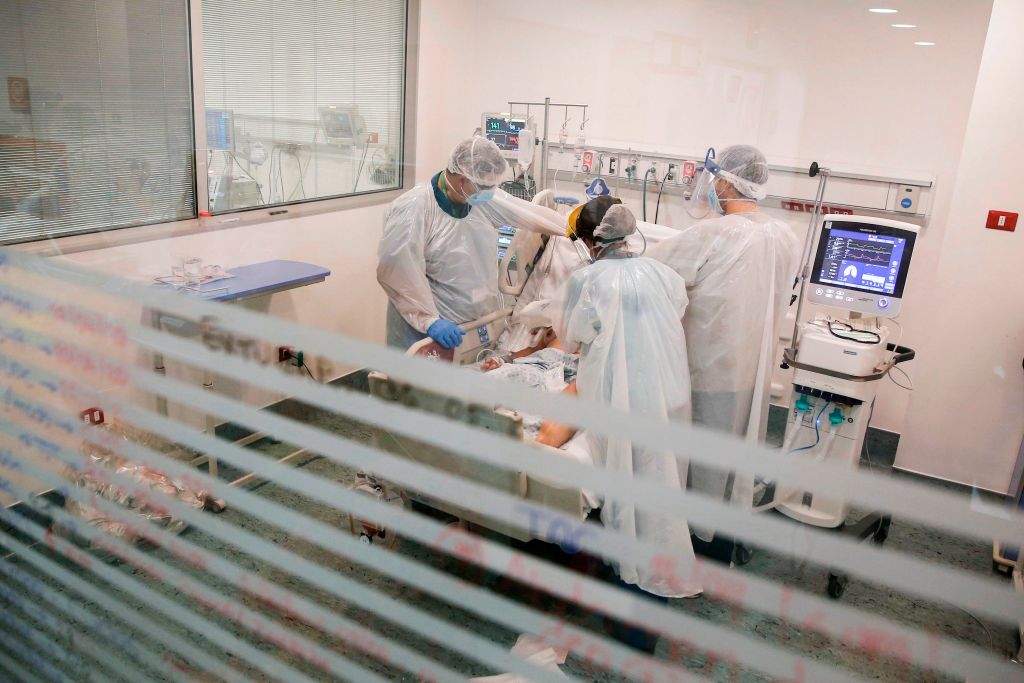Nutrition’s essential role in critical care patients

Tips for implementing nutrition into a care plan
By Medline Newsroom Staff | March 22, 2021
Clinicians saw a flood of intubated ICU patients in 2020 due to COVID-19. Even before the pandemic, there has been an increase in ventilated patients, putting them at risk for swallowing disorders like dysphagia. Studies indicate that a wide range of people with critical illness will have difficulty swallowing, and this increases the longer someone is intubated.
Appropriate and timely nutritional intervention can play a vital role in the prevention of dehydration, malnutrition and promotion of recovery. It is essential for patient care teams to recognize the need to improve nutrition coordination across care settings and develop an individualized care plan.
The Medline Newsroom spoke with Amy Rogers, a clinician on the healthcare company’s Nutrition team, about how nutrition plans can be clearly communicated when patients are discharged from the hospital.
Newsroom: What do you think healthcare has learned during the pandemic about the role nutrition plays to help respiratory care patients thrive?
Amy Rogers: Many ICU patients in the past year have been there due to COVID-19, but we know that the path to recovery is different for each person. Nutrition is an essential component to prevention and recovery. It is individualized and although there are general guidelines for staying healthy, what works for one person may not work for others. There’s been a lot of marketing around “immune boosting” and “certain supplements to prevent illness” and while some components of their ingredients are beneficial, there is no magic pill for preventing illness. The best defense is consuming a variety of whole foods to meet your macro and micro nutrient needs and keeping gut microbiome healthy. If nutritional needs cannot be met with whole foods, oral nutritional supplements and probiotics are recommended. Working with a registered dietitian can help improve nutritional intake and aid in quick recovery.
Newsroom: As a patient is discharged from the hospital to a home health setting, why is it important for the care transitions team to work together to ensure the nutrition plan is carried through to the new care setting?
Amy Rogers: Nutrition is everyone’s job. Unfortunately, it’s not everyone’s top priority which leads to it being frequently undiagnosed. Reports show 50% of hospitalized patients are at risk for malnutrition, yet only 7% are diagnosed. Studies show that when nutrition is part of the interdisciplinary team’s goals, it can lead to better patient outcomes. We must create a culture where the entire care team values nutrition. The dietitian recommends the nutrition orders, while the nurse carries out the plan. Frequent communication between both clinicians will help determine how the plan is working and when changes are required.
Newsroom: How can care teams ensure nutrition isn’t overlooked in the hospital and after discharge?
Amy Rogers: Intubated patients often lose lean muscle mass. There are generally no formal guidelines for a person post-ICU discharge, but we know that optimizing calorie and protein intake can help speed up recovery and need additional calories and protein to regain strength. Good communication from the hospital care transition team to home health clinicians is key for ensuring the person discharged thrives at home.
Here are three tips to consider when creating a nutrition plan:
- Awareness of patient’s new reality. It is one thing to write a recommendation for nutrition goals and another thing for the person to actually follow the recommendations and meet their nutrition requirements. A discharged ICU patient is at high risk for loss of appetite, swallowing disorders, and impairments in gut motility and emptying which will impact how they are able to meet their intake goals.
- Early malnutrition risk assessment and intervention. Every patient should be screened for malnutrition using a validated nutrition screening tool upon admission to the hospital and when admitted to a post-acute care facility or to the home setting. A malnutrition risk assessment can help indicate if intervention is necessary. Proper nutrition impacts the whole body so the longer malnutrition goes undetected, the more likely the person is to lose weight and it can start to impact organs and cause difficulty in wound healing.
- Frequent monitoring and teamwork. The health of a discharged ICU patient often fluctuates so clinicians should closely monitor the patient’s nutrition status, communicate with the entire care team and create individualized nutrition care plans to not simply meet their needs, but allow them to thrive.
Rogers says all clinicians should receive regular education about impact of nutrition and all patients must be screened upon admission and throughout their stay.
Learn more about how Medline is supporting nutritional health and helping promote optimal patient health.
Medline Newsroom Staff
Medline Newsroom Staff
Medline's newsroom staff researches and reports on the latest news and trends in healthcare.
